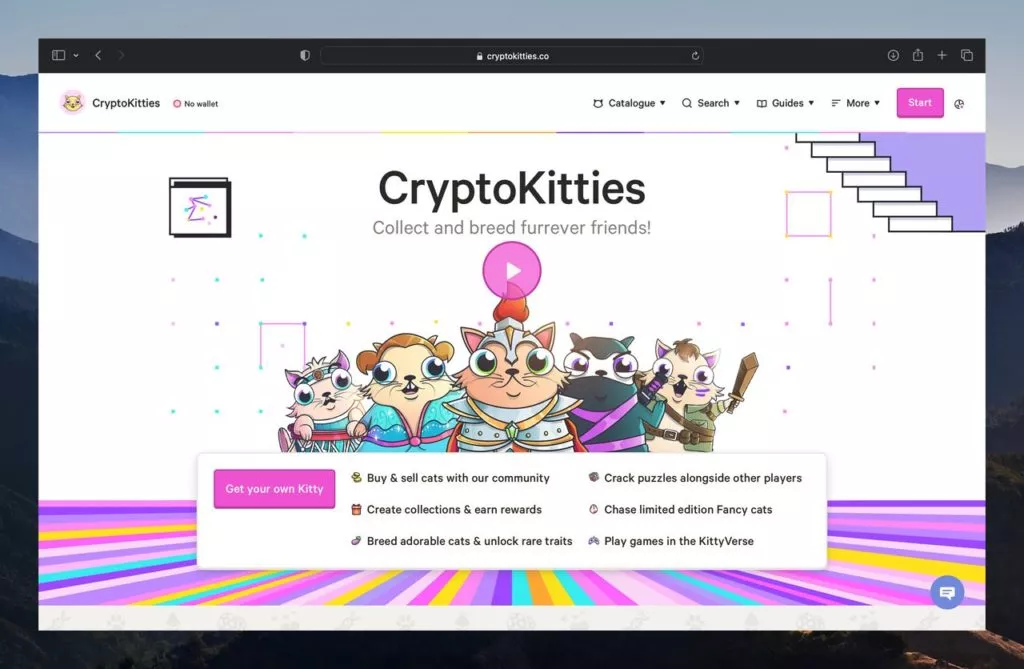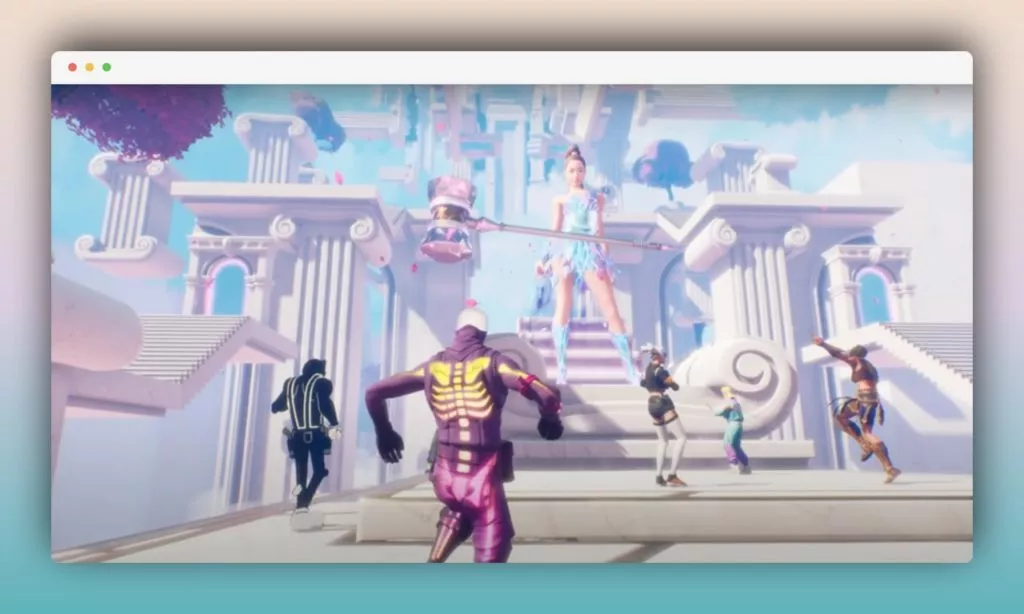Greetings, Metaversians! The undeniable truth is that metaverse marketing is the frontier of the future of advertising.
The metaverse, an expansive virtual reality realm where individuals engage, trade goods, and manifest their aspirations, is reshaping the marketing landscape.
What does this mean for marketers? It signals the imminent obsolescence of traditional advertising methods.
Metaverse marketing offers a unique avenue to craft a distinctive world that mirrors your brand identity. Using words, images, and videos allows unparalleled creative expression—a trend gaining significant traction, particularly with the widespread adoption of VR headsets in households globally.
What is the Metaverse?
Have you ever visited a Van Gogh expo where augmented reality brings paintings to life, allowing you to immerse yourself in the artwork physically?
Picture 360-degree projections and VR glasses transporting you to a world of mesmerizing paintings. Van Gogh expo showcasing Sunflowers and other paintings with people immersed in augmented reality.
Now, envision experiencing such artistic wonders without leaving your home, all from the comfort of your couch.
How is this possible? Enter the metaverse. Coined by Neal Stephenson in his 1992 science fiction novel Snow Crash, the term “metaverse” comprises “meta” (beyond) and “verse” (from “universe”).
“The Metaverse is a hypothesized iteration of internet, supporting persistent online 3-D environments through traditional personal computing, and VR and AR headsets.”
This virtual realm enables users to engage through virtual or augmented reality, revolutionizing social activities and entertainment.
Built upon the pillars of presence, immersion, and interactivity, the meta is a shared virtual space merging enhanced physical reality and persistent virtual realms. It encompasses all virtual worlds, augmented reality, and the internet.

Key Characteristics:
- Persistence: An entirely immersive, shared experience—a parallel reality existing in real-time, never ceasing.
- Synch: Users interact in real-time, reacting to their virtual environment and each other, mirroring physical-world interactions.
- User-Driven: Empowers users to create or enhance content, fostering a participatory environment.
- Self-Sufficient: Houses fully functioning economies driven by non-fungible tokens, cryptocurrency, and more.
Benefits of Metaverse Marketing:
- Immersive Brand Experience: The meta offers an unparalleled immersive environment where brands can create a unique and captivating experience for their audience. Through VR and AR, marketers can transcend traditional boundaries, allowing consumers to engage innovatively with products and services.
- Enhanced Storytelling: Metaverse marketing provides a dynamic platform for storytelling. Brands can craft narratives that unfold in three-dimensional spaces, leveraging the interactive nature of the metaverse to convey messages with depth and impact. This immersive storytelling resonates more profoundly with audiences.
- Global Accessibility: Unlike physical locations, the metaverse knows no geographical constraints. Brands could reach a global audience without the limitations of physical distance. This accessibility fosters inclusivity and enables businesses to connect with diverse demographics worldwide.
- Interconnected Social Engagement: The metaverse is inherently social, facilitating real-time interactions and collaboration. Brands can leverage this interconnectedness to create communities, host virtual events, and engage with consumers personally. This social dimension adds depth to brand-consumer relationships.
- Innovative Product Display: Metaverse environments provide innovative ways to showcase products and services. Virtual showrooms, interactive displays, and immersive demonstrations allow consumers to explore offerings in a virtual space, enhancing the shopping experience and influencing purchasing decisions.
- NFTs and Virtual Assets: The rise of non-fungible tokens (NFTs) within the metaverse introduces new avenues for marketing. Brands can create exclusive virtual assets, limited edition items, or virtual real estate. This adds a layer of exclusivity and opens up new monetization strategies.
- Data-Driven Insights: Meta platforms generate extensive data on user behavior, interactions, and preferences. Marketers can leverage these insights to refine and optimize their strategies. The wealth of data allows for targeted campaigns, personalized experiences, and a deeper understanding of consumer trends.
- Future-Proofing Marketing Strategies: Embracing the meta positions brands at the forefront of technological advancements. As the metaverse evolves, early adopters gain a competitive advantage by staying ahead of the emerging trends. This forward-thinking approach future-proofs marketing strategies in an ever-changing digital landscape.
Best Practices for Metaverse Marketing:
1. Stay Informed about the Metaverse
To actively participate in metaverse marketing, you must familiarize yourself with key concepts. Let’s introduce two essential terms to your lexicon: Centralized and Decentralized worlds. Consider popular social media platforms like Facebook or Youtube. These operate within a centralized system, where a central authority controls the data. For instance, when sharing a post with a friend on Facebook, the central platform, in this case, Facebook, knows about the exchange, verifies the data, and facilitates the transfer.
In a centralized world, platforms like Facebook wield control. Now, contrast this with a decentralized world.
The notion of a decentralized world gained prominence with the advent of Bitcoin in 2009. Through blockchain technology, sending bitcoin to a friend doesn’t follow the centralized steps.
Tip: A blockchain serves as a shared, unalterable ledger, streamlining transaction recording and asset tracking in a business network.
2. Build Brand Awareness through Non-Fungible Tokens (NFTs)
Tokens, stored on the blockchain ledger, play a pivotal role in meta interactions. Understanding the distinction between Fungible and Non-Fungible tokens is essential for effective brand engagement.
- Fungible tokens are interchangeable units of the same kind, like a dollar bill that can be exchanged for another dollar bill or digital currencies such as Bitcoin.
- Non-Fungible tokens (NFTs) represent unique, one-of-a-kind digital items. Take CryptoKitties, an Ethereum-based game where users buy and trade virtual cats.

Each cat is one-of-a-kind and 100% owned by you; it can not be replicated, taken away, or destroyed.” NFTs, being non-fungible tokens secured on the blockchain, carry intrinsic uniqueness.
Integrating NFTs into your marketing strategy allows you to promote the brand and NFT assets simultaneously. The rising value of your NFTs, coupled with the attention garnered by your brand, creates a symbiotic relationship, enhancing brand awareness.
3. Harness the Potential of AR in Marketing
Augmented Reality (AR) is an interactive encounter with the real world, where actual objects are supplemented with computer-generated perceptual information. But how can you leverage it for marketing?
Consider IKEA’s innovative approach with its app, IKEA Place. This application allows users to try out IKEA products virtually in any environment using AR. Whether you want to test a new piece of furniture in your living room or experiment with different designs, IKEA Place makes it possible.

The app employs 3D modeling and true-to-scale representations to ensure users have an experience closely mirroring reality. This addresses potential customer doubts regarding size, design, and functionality. IKEA Place is a game-changing example in the marketing realm, serving as a source of inspiration.
4. Incorporate Metaverse Gaming into Your Marketing Strategy
Integrating meta games into your marketing strategy provides a fun and distinctive method to attract attention organically. Major brands like Wendy’s have already embraced the metaverse for their marketing goals.
In a Fortnite gaming metaverse campaign, Wendy’s set out to destroy all burger freezers, emphasizing the freshness of their food. This creative move engages users within the gaming space and aligns with their brand narrative.

Similarly, Deliveroo, a prominent online food delivery company, entered the virtual world of “Animal Crossing” to simulate real-world deliveries, offering players a promotional code for use in reality. The result? Over 3 million player interactions.

5. Establish a Walk-In Store in the Metaverse
Imagine walking into a store, exploring products, and trying things out—all from the comfort of your home. This scenario represents a compelling way to leverage the metaverse for marketing objectives.
VR enables users to interact with environments and objects without being physically present. This immersive experience has vast potential for various industries. While the technology continues to evolve, understanding the concept and adapting it to suit your business needs is a forward-thinking approach. Offering customers a unique and interactive experience is undoubtedly a key advantage.

6. Host Live Events in the Metaverse Universe
Meta events eliminate the constraints of physical locations, enabling anyone from anywhere to participate without attendee limits. This is particularly valuable in a post-pandemic world where physical venues may have capacity restrictions.
Virtual events can reach a global audience, ranging from concerts to seminars. Notable instances include Justin Bieber’s meta-universe concert on the virtual music platform Wave and Ariana Grande’s series of concerts within the Fortnite video game.

The potential extends beyond entertainment, encompassing seminars, conferences, training sessions, and more. The meta offers a highly interactive experience, allowing people to engage in two-way dialogues without needing physical travel. This flexibility enables businesses to connect with customers globally, promoting products and achieving marketing goals without the constraints of geographical distances.
7. Leverage the Power of Brand Avatars
Avatars, virtual representations of individuals, allow for meticulous customization, encompassing details like eye color, body shape, nose, and lips. Introduced by Snapchat, avatars have seamlessly transitioned into the metaverse.
Prominent brands such as Gucci and Nike have embraced avatars in their marketing strategies. In collaboration with renowned singer Miley Cyrus, Gucci ingeniously utilized an avatar of Cyrus in the digital rendition of its ad campaign for a new fragrance.

Your brand can capitalize on the trend to enable customers to create personalized avatars in the metaverse, incorporating your products for further customization. Encouraging customers to share their avatars on social media enhances exposure and increases brand awareness.
8. Craft Compelling 3D Models.
Creating 3D models is pivotal for developing immersive content in the metaverse. As Virtual Reality (VR) gains widespread adoption, the demand for 3D models intensifies, given their role in crafting interactive and immersive experiences. Incorporating 3D models into your marketing strategy aligns with the evolving landscape of VR technology. These models contribute to the creation of engaging and visually compelling environments.
Adapting your brand and company to the metaverse involves embracing the utilization of 3D models. The increasing adoption of VR across various industries underscores the significance of immersive content.
Navigating Metaverse Marketing Challenges
a. Finding the Right Metaverse Platform
The metaverse is not a singular entity but an ecosystem comprising various immersive virtual worlds vying for user engagement, events, and gaming experiences. Platforms like Decentraland, Sandbox, and Roblox are notable examples.
Conduct thorough research on demographics, land costs, growth prospects, and monthly user statistics for different metaverse platforms. Choose the one that aligns best with your business needs and objectives.
b. Embracing Continuous Adaptation
The metaverse is in its nascent stages, with new developments emerging regularly. Staying abreast of evolving trends and options within the metaverse is crucial. Remaining adaptable ensures that your marketing strategies align with the dynamic nature of this burgeoning digital realm.
Discovering Novel Dimensions of Interaction
While we are still immersed in traditional billboards, print ads, and conventional marketing avenues, it is evident that a paradigm shift is necessary for effective metaverse marketing. The logic and logistics of advertising in platforms like Decentraland and Sandbox markedly differ from the physical world.
In essence, metaverse users crave authentic experiences. Examining the strides of industry giants such as Gucci, a trailblazer in metaverse marketing, unveils the need for creativity in providing users and their avatars with unprecedented and intriguing encounters.
Regardless of your industry, elevating marketing efforts is imperative to thrive in the ever-evolving metaverse.
Monitoring Performance Metrics
In traditional marketing, many Key Performance Indicators (KPIs) and metrics guide businesses in assessing performance. However, traditional metrics might need to be more insightful in the metaverse. Engagement emerges as a pivotal metric, though specific metaverse KPIs are still evolving.
Adapting strategies to focus on user engagement while being open to emerging metaverse metrics will be crucial for success.
Transient Challenges
The allure of novel concepts often raises concerns about their stability, and the metaverse is no exception. Despite the current enthusiasm about its transformative potential, the metaverse’s sustained appeal remains to be determined. Prudent steps and careful consideration are advocated to navigate marketing strategies in the dynamic metaverse universe.
Addressing Customer Apprehensions
On the customer front, data privacy emerges as a paramount concern in the metaverse. Research indicates worries about simulated reality addiction, privacy issues, and mental health implications. Tracking and misuse of data, online abuse, and cyber bullying also feature prominently among potential concerns.
Addressing these apprehensions and ensuring a secure and transparent metaverse environment is imperative for marketing efforts to yield results.
Metaverse Statistics Snapshot
- Marshmello’s Fortnite concert drew 10.7 million in-game attendees in 2019, with the actual viewership likely higher when factoring in platforms like Twitch.
- Travis Scott’s 2020 Fortnite Astronomical event reached 45.8 million attendees, and his YouTube channel views surpassed 77 million.
- A digital Gucci bag on Roblox, the gaming platform, was sold for $4,115, exceeding its store price of $3,400.
- As exemplified by Everydays: the First 5000 Days, NFTs sold for a staggering $69.3 million.
- VR market is anticipated to grow to $6.71 billion in 2022, doubling to $12.19 billion by 2024.
- Roblox boasts over 52.2 million daily active users as of Q2 2022.
Conclusion:
As the metaverse continues its exponential growth, businesses must adapt, anticipate, and capitalize on emerging technologies like AR and VR, consumer journey analytics, and social commerce. By promptly formulating and executing strategic plans, companies can harness the vast benefits of metaverse marketing’s promising future.
FAQs on Metaverse Marketing:
What platforms are commonly used for Metaverse Marketing?
Popular platforms for Metaverse Marketing include virtual worlds like Decentraland, Roblox, and Second Life, as well as augmented reality applications like Snapchat and Instagram filters.
What industries can benefit the most from Metaverse Marketing?
While many industries can benefit, sectors such as gaming, entertainment, real estate, education, and retail are particularly well-suited for Metaverse Marketing due to the immersive and interactive nature of these environments.
Is Metaverse Marketing only for large businesses, or can small businesses benefit too?
Metaverse Marketing is accessible to businesses of all sizes. Small businesses can leverage cost-effective solutions, collaborate with existing metaverse platforms, and creatively engage with their audience to make a significant impact in the virtual space.



